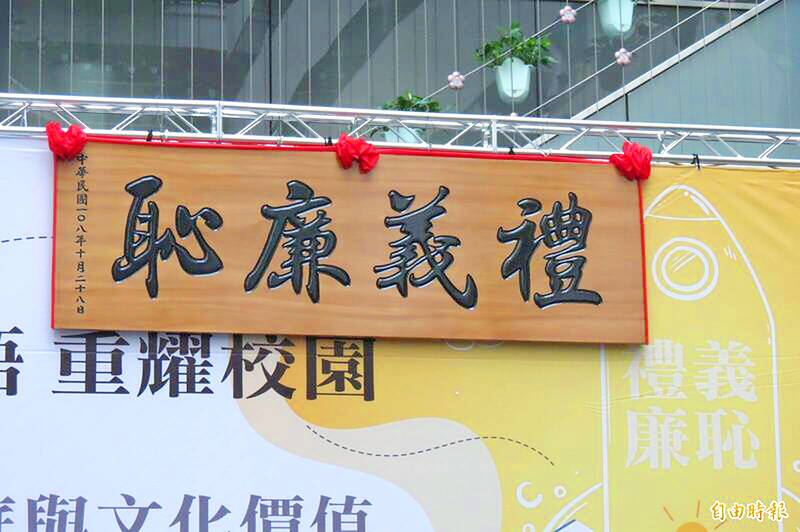A reduction in classical Chinese content under curriculum guidelines for senior and vocational high schools would lead to the “desinicization” of students, a high-school teacher has said, generating a heated discussion on the standards put in place in 2019.
Ou Kui-chih (區桂芝), who teaches Chinese literature at Taipei First Girls’ High School, on Monday criticized the Ministry of Education’s “108 curriculum” for reducing the number of classical Chinese texts taught in schools.
Writings about morality by Ming Dynasty academic Gu Yanwu (顧炎武) were not included in the guidelines, she said, calling the omission “shameless.”

Photo: Taipei Times file
The Ministry of Education said the guidelines focus on authors from different eras to build students’ competence, and help them become law-abiding citizens with proper moral compasses.
Vice Premier Cheng Wen-tsan (鄭文燦) on Friday said that memorizing classical Chinese literature does not teach students about morality.
Classical Chinese still occupies a significant portion of the curriculum, Cheng added.
Democratic Progressive Party Legislator Wang Ting-yu (王定宇) said the curriculum never “removed” classical literature, but “suggested” new texts, which were to be added at a publisher’s discretion.
If Ou believes that Ku’s work titled "Honesty and Morality (廉恥)" should be included in teaching materials, she should meet with publishers and urge them to add it, or teach the text during class, Wang said.
Writer Chu Yu-hsun (朱宥勳) said the onus of what to teach was not on the curriculum guidelines, but on the textbook publishers and the teachers, adding that while the works of poet Yu Kwang-chung (余光中) were not among the ministry’s suggested texts, many schools still teach his poetry.
Former president Ma Ying-jeou (馬英九) on Friday said he admired Ou for speaking out, while Chinese Nationalist Party (KMT) Vice Chairman Sean Lien (連勝文) yesterday said that the Democratic Progressive Party (DPP) was using the guidelines to make Taiwanese “illiterate.”
New Taipei City Mayor Hou You-yi (侯友宜), the KMT’s presidential candidate, on Friday said that if he were elected, he would chair a national affairs conference to discuss changing the curriculum guidelines.
Vice President William Lai (賴清德), the DPP’s presidential candidate, yesterday said that the guidelines were designed as a reference for publishers to gauge what materials to include in their textbooks.
Publishers should consult with teachers to discuss issues about the content of textbooks, Lai said, adding that the guidelines are not intended to be exactly what should appear in the books.
Taiwan People’s Party Chairman and presidential candidate Ko Wen-je (柯文哲) on Friday said that he opposes desinicization in the curriculum guidelines.
“Taiwan must make clear to China that we share the same language, ethnicity, history, religion and culture, but that we each have different political models and lifestyles,” he said. “We do not have to abandon the whole culture just because we are in competition with China.”
Additional reporting by Shih Hsiao-kuang, Lin Che-yuan and Peng Chien-li

The Grand Hotel Taipei on Saturday confirmed that its information system had been illegally accessed and expressed its deepest apologies for the concern it has caused its customers, adding that the issue is being investigated by the Ministry of Justice Investigation Bureau. The hotel said that on Tuesday last week, it had discovered an external illegal intrusion into its information system. An initial digital forensic investigation confirmed that parts of the system had been accessed, it said, adding that the possibility that some customer data were stolen and leaked could not be ruled out. The actual scope and content of the affected data

DO THEY BITE IT? Cats have better memories than people might think, but their motivation is based entirely around the chance of getting fed Cats can remember the identity of the people who fed them the day before, Taipei-based veterinarians said on Friday, debunking a popular myth that cats have a short memory. If a stray does not recognize the person who fed them the previous day, it is likely because they are not carrying food and the cat has no reason to recognize them, said Wu Chou Animal Hospital head Chen Chen-huan (陳震寰). “When cats come to a human bearing food, it is coming for the food, not the person,” he said. “The food is the key.” Since the cat’s attention is on the food, it

‘LIKE-MINDED PARTNER’: Tako van Popta said it would be inappropriate to delay signing the deal with Taiwan because of China, adding he would promote the issue Canadian senators have stressed Taiwan’s importance for international trade and expressed enthusiasm for ensuring the Taiwan-Canada trade cooperation framework agreement is implemented this year. Representative to Canada Harry Tseng (曾厚仁) in an interview with the Central News Agency (CNA) said he was increasingly uneasy about Ottawa’s delays in signing the agreement, especially as Ottawa has warmed toward Beijing. There are “no negotiations left. Not only [is it] initialed, we have three versions of the text ready: English, French and Mandarin,” Tseng said. “That tells you how close we are to the final signature.” Tseng said that he hoped Canadian Prime Minister Mark Carney

President William Lai (賴清德) yesterday bestowed one of Taiwan’s highest honors on Saint Vincent and the Grenadines (SVG) Ambassador Andrea Clare Bowman in recognition of her contributions to bilateral ties. “By conferring the Order of Brilliant Star with Grand Cordon on Ambassador Bowman today, I want to sincerely thank her, on behalf of the Taiwanese people, for her outstanding contribution to deepening diplomatic ties between Taiwan and SVG,” Lai said at a ceremony held at the Presidential Office in Taipei. He noted that Bowman became SVG’s first ambassador to Taiwan in 2019 and